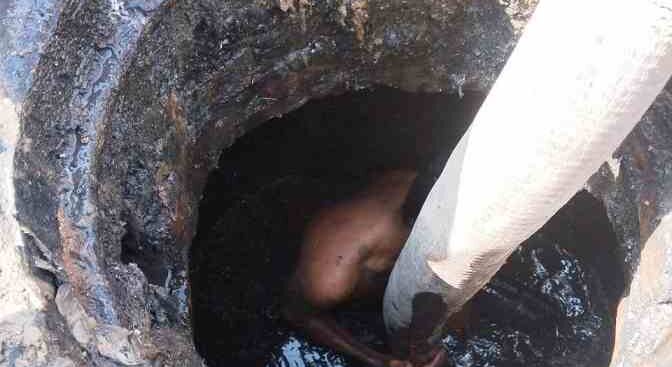On the evening of April 17, 2023, as soon as Aijaz Ahmed, a sanitary worker of Rajanpur’s Rozhan Mazari tehsil, landed in the gutter, the poisonous gas of the sewerage line cut off his senses and he fell unconscious. After some time, his colleague Mohammad Hussain, who was outside the gutter, called him. Unable to get any response, he landed in the gutter to find out about Aijaz’s well-being and he fainted due to the effect of poisonous gas.
When the municipality officials reached the disposal point, they found both of them falling into the gutter. The officials rushed them to the hospital but by then both of them were dead.
Cleaning gutters and drains was Aijaz Ahmed’s family occupation. His father, Ghulam Nabi, was also a sanitary worker at The Municipality of Rozhan Mazari. Fifteen years ago, when he died in service, the department replaced him with his son Aijaz.
Although Aijaz was recruited as a sanitary worker, he was also hired to open closed gutters, which is in principle the duty of a sewer man. They were not even given any necessary equipment like gas masks, oxygen cylinders, dry suits, and gas detectors by the municipality for this work.
The unavailability of the same equipment led to his death. He is survived by a widow and four children.
Mohammad Hussain, who died along with Aijaz Ahmed, used to work as a cleaner for Rs 8,000 per month instead of an upper caste official posted as the post of a sanitary worker in the municipality. His family does not expect any compensation or job from the municipality.
When this correspondent approached the office of the Chief Officer of Rozhan Municipality for a detailed assessment of the motive of these killings, it was found that no Chief Officer has been posted there for the last six months and the additional charge of the municipality is with Sajid Riaz, Chief Officer of District Council Rajanpur.
Nadeem Gokhani, the sanitary supervisor of Municipality Rozhan, said that the sewerage line in the city was laid 20 years ago with the financial support of the United Arab Emirates, but sewer men were not recruited for it nor support kits were provided to the staff.

“The municipality currently has 50 sanitary workers, eight of whom also do the work of cleaning the sewerage line when needed. If the sewerage line is closed, the sanitary worker has to get into the gutter without a gas mask and other protective equipment. If Aijaz and Muhammad Hussain had protective gear, they could have survived. ”
Abdul Rauf, a clerk in the office, cited a lack of funds as the main reason for not providing protective gear to the staff. He said that the municipality gets Rs5.3 million per month from the Punjab government for salaries and other expenses while the requirement is Rs9 million.
“A few years ago, development tax, license fee, professional tax, basement fees, and cattle market contracts fetched the municipality good revenue. But in different periods, the governments abolished these taxes, which reduced the sources of income of the municipality compared to the expenditure. At present, WAPDA owes Rs9.3 million to The Municipality of Rozhan. The funds we get from the Punjab government do not even meet the salaries of the staff. There is such a shortage of financial resources that we cannot even buy sewer covers for sewerage lines. ”
Mohammad Suleiman, a resident, says that nowhere in the world is it possible to lay a sewer line, but sewer men should not be recruited to clean it. This is happening only in underserved areas where sanitary workers recruited to sweep the street are stripped naked into a toxic sewage well. The officials who are not lucky among them are never able to come out of the gutter.
The 29-year-old sanitary worker, who works with Aijaz Ahmed, said on condition of anonymity that he is not taken the job for which he has been recruited.
“We are made to clean the main sewerage line and big gutters without any security arrangements. We poor people can’t even deny the officers for fear of their displeasure and that’s why we keep working quietly considering these situations as destiny. ”
